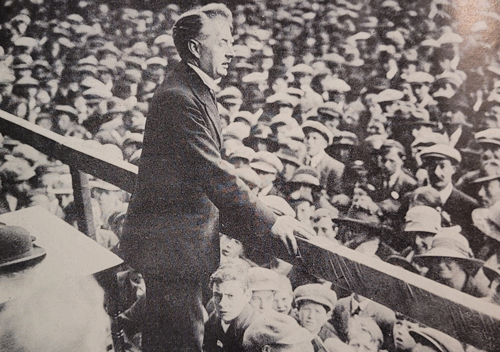Government wishes to “wipe out memory” of last 12 months
President W.T. Cosgrave makes first appearance in Kilkenny constituency since last year’s election
Dublin, 28 May 1923 - The President of the Executive Council of the Irish Free State government, Mr. William T. Cosgrave has said that his government wishes ‘to wipe out the memory of the last 12 months’ and forget the injuries that had been done to people. Furthermore, he hoped that the lesson learned by the country would prevent any section of the community from attempting what had been done during the last year.
Mr. Cosgrave was speaking yesterday at a large public gathering on the Parade in Kilkenny during his first visit to his constituency since becoming head of the government.
A civic reception was laid on for the President on his arrival, tributes were paid to him by the Corporation and other public bodies, and the streets thronged with people who had come from surrounding districts, as well as on special trains from Dublin, Waterford, Maryborough and other locations.
However, the centre-piece of his visit was the address on the parade to a crowd that has been estimated at around 4,000 people. President Cosgrave’s remarks about the memory of the last 12 months came towards the end of a speech which was wide-ranging in nature and touched on issues such as the Constitution, law and order, housing, the economy and public finances, land legislation.
Mr. Cosgrave told his audience that his government had, since last year’s election, not flinched from the ‘hard, painful, and shocking task’ of establishing order in the country and putting forth the people’s will as the sovereign authority in the country.
In doing so, they had built an army and a police force and busied themselves in constructing the fabric of government. There was, he said, no Finance Ministry when they took up Government and beyond the Local government department and army GHQ, there was little else.
Now, even if the government was to change tomorrow, ‘the machine was there - a machine that was loyal to whatever Government the people of this country elected.’
On the subject of the Constitution of the Irish Free State, the President expressed the view that ‘in no other country in the world was there an instrument which was as democratic as our Constitution’, and added to this was legislation entitling every adult over 21 to the franchise.
Between Two Hells – The Irish Civil War: Diarmaid Ferriter in Conversation with Ronan McGreevy
There remained major challenges in housing and it was necessary, he said, to improve every single service in the country and to do so supported with a sound system of commerce. To this end, it would be necessary for the government to float a loan to which everyone who had an interest in the future of the country would be expected to subscribe.
The Government, he added, was involved in continuing the work which the late President Arthur Griffith and the late Commander in Chief, Michael Collins, had handed over to it and as long as they had the support of the people they would continue to do so.
According to Mr. Cosgrave, the time was not ripe for a sectional government. ‘Just now in some parts of the country the feeling was running rather high between what was called Capital and what was called Labour, and a Government of either one or other of these sections just now would not command generous national support..’
Continuing, he said that new national organisation of which he was a part, Cumann na nGaedhael, had as its central purpose the welding together of ‘all the different sections of the nation; to reorganise the national life; to reinvigorate the national aspiration; and to keep the lamp of nationality burning brightly.’
Finally, Mr. Cosgrave reiterated his government’s desire for a quick and secure peace. ‘People’, he declared, were ‘entitled to that, and we are going to continue in that attitude so long as the people of the country will support us.’
[Editor's note: This is an article from Century Ireland,
a fortnightly online newspaper, written from the perspective
of a journalist 100 years ago, based on news reports of the
time.]





















